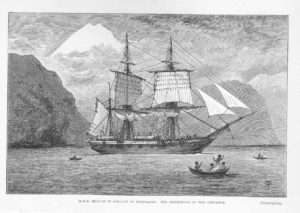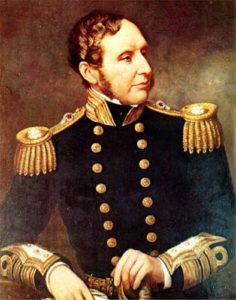This conservation calendar could include a story almost every day of the year about Charles Darwin and the second voyage of the Beagle. And there are a few scattered through the year. But today is special, because May 11, 1820, is the birthday of the boat that carried Darwin, HMS Beagle.
Beagle was born at the Woowich Dockyard in London. The dockyard was one of two built in the early 1500s by order of Henry VIII, who wanted boat-building to occur near his palace at Greenwich. Hundreds of ships were built at Woolwich and its companion, Deptford, over the centuries.
Beagle was built originally as an armed vessel, known as a brig (i.e, it had two masts). It carried ten cannons that could be used as needed during scouting and courier missions. The boat was 90 feet long and 24.5 feet wide. However, the Royal Navy found no immediate use for the capabilities of Beagle.

So, the ship was refitted to become a surveying vessel in 1825. The changes made the ship into a “bark” by adding a third mast. It was sent on its first voyage in 1826, a four-year survey of South America’s coastline. The original captain committed suicide on the voyage, and command was taken over by Robert Fitzroy.

The second voyage of the Beagle is the one we all remember. Fitzroy remained the ship’s captain. Beagle was again re-built, raising the deck a foot and adding an outer hull of wood to increase its strength and flexibility. The task of the voyage was to sail around South America and then the entire earth, completing accurate measurements of the longitude of the earth. It carried a host of surveying and other experimental equipment, including 22 clocks (necessary to plot location) and lightning conductors. It carried a large crew, 68 in all, that made the ship incredibly crowded. Fitzroy thought the ship was perfect for the task at hand:
“Never, I believe, did a vessel leave England better provided, or fitted for the service she was destined to perform, and for the health and comfort of her crew, than the Beagle. If we did want any thing which could have been carried, it was our own fault; for all that was asked for, from the Dockyard, Victualling Department, Navy Board, or Admiralty, was granted.”
The second voyage lasted from 1831 to 1836. The ship was gone for 1742 days and traveled almost 40,000 miles.
Among the 68 crewmen was Charles Darwin. His task was to observe the natural history of the locations they visited, most of which were still barely explored. “Natural history” in those days included plants, animals, geology and fossils. To say that he enjoyed himself would be a classic understatement:
“The voyage of the Beagle has been by far the most important event in my life, and has determined my whole career …. I have always felt that I owe to the voyage the first real training or education of my mind; I was led to attend closely to several branches of natural history, and thus my powers of observation were improved….”
And the rest, as we say, is history. Darwin spent two decades researching the specimens he brought back and working out the concepts of natural selection and evolution.
While Darwin was working on his data and ideas, Beagle was not idle. The ship went back to sea the next year, on a six-year voyage to survey the coast of Australia. But three voyages were enough—in 1845, the Beagle’s masts were removed and the hull was moored in the estuary near Essex, England, to discourage smugglers. It was renamed Watch Vessel 7. After 25 years of such service, in 1870 what remained of the ship was decommissioned, broken apart and sold for scrap.
References:
HMS Beagle Project. Charles Darwin Describes His Time Aboard the Beagle. Available at: http://www.hmsbeagleproject.org/timeline/charles-darwin-describes-his-time-aboard-beagle/. Accessed May 7, 2018.
Royal Museums Greenwich. HMS Beagle. Available at: https://www.rmg.co.uk/discover/explore/hms-beagle. Accessed May 7, 2018.
Thomson, Keith S. Beagle (ship). Encyclopedia Britannica. Available at: https://www.britannica.com/topic/Beagle-ship. Accessed May 7, 2018.
Today in Science. Beagle Quotes. Today in Science History. Available at: https://todayinsci.com/QuotationsCategories/B_Cat/Beagle-Quotations.htm. Accessed May 7, 2018.
